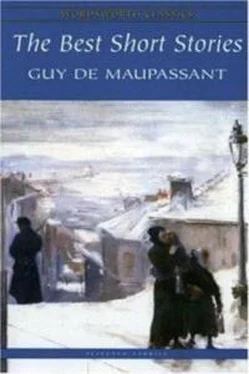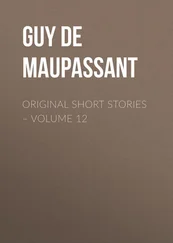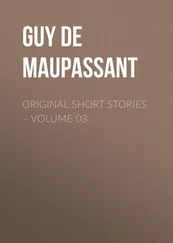When I returned to the sitting–room I found that Paul had shut himself in the other room, so I sat down to wait.
A waiter went to and fro, bringing plates and glasses. He laid the table slowly, then put a cold chicken on it, and told me that all was ready.
I knocked gently at Mademoiselle Rondoli's door. "Come in," she said, and when I did so I was struck by a strong, heavy smell of perfumes, as if I were in a hairdresser's shop.
The Italian was sitting on her trunk in an attitude either of thoughtful discontent or absent–mindedness. The towel was still folded over the waterjug that was full of water, and the soap, untouched and dry, was lying beside the empty basin; but one would have thought that the young woman had used half the contents of the bottles of perfume. The eau de cologne, however, had been spared, as only about a third of it had gone; but to make up for that she had used a surprising amount of lavender–water and new–mown hay. A cloud of violet powder, a vague white mist, seemed still to be floating in the air, from the effects of her over–powdering her face and neck. It seemed to cover her eyelashes, eyebrows, and the hair on her temples like snow, while her cheeks were plastered with it, and layers of it covered her nostrils, the corners of her eyes, and her chin.
When she got up she exhaled such a strong odor of perfume that it almost made me feel faint.
When we sat down to supper, I found that Paul was in a most execrable temper, and I could get nothing out of him but blame, irritable words, and disagreeable remarks.
Mademoiselle Francesca ate like an ogre, and as soon as she had finished her meal she threw herself upon the sofa in the sitting–room. Sitting down beside her, I said gallantly, kissing her hand:
"Shall I have the bed prepared, or will you sleep on the couch?"
"It is all the same to me. 'Che mi fa'!"
Her indifference vexed me.
"Should you like to retire at once?"
"Yes; I am very sleepy."
She got up, yawned, gave her hand to Paul, who took it with a furious look, and I lighted her into the bedroom. A disquieting feeling haunted me. "Here is all you want," I said again.
The next morning she got up early, like a woman who is accustomed to work. She woke me by doing so, and I watched her through my half–closed eyelids.
She came and went without hurrying herself, as if she were astonished at having nothing to do. At length she went to the dressing–table, and in a moment emptied all my bottles of perfume. She certainly also used some water, but very little.
When she was quite dressed, she sat down on her trunk again, and clasping one knee between her hands, she seemed to be thinking.
At that moment I pretended to first notice her, and said:
"Good–morning, Francesca."
Without seeming in at all a better temper than the previous night, she murmured, "Good–morning!"
When I asked her whether she had slept well, she nodded her head, and jumping out of bed, I went and kissed her.
She turned her face toward me like a child who is being kissed against its will; but I took her tenderly in my arms, and gently pressed my lips on her eyelids, which she closed with evident distaste under my kisses on her fresh cheek and full lips, which she turned away.
"You don't seem to like being kissed," I said to her.
"Mica!" was her only answer.
I sat down on the trunk by her side, and passing my arm through hers, I said: "Mica! mica! mica! in reply to everything. I shall call you Mademoiselle Mica, I think."
For the first time I fancied that I saw the shadow of a smile on her lips, but it passed by so quickly that I may have been mistaken.
"But if you never say anything but Mica, I shall not know what to do to please you. Let me see; what shall we do to–day?"
She hesitated a moment, as if some fancy had flitted through her head, and then she said carelessly: "It is all the same to me; whatever you like."
"Very well, Mademoiselle Mica, we will have a carriage and go for a drive."
"As you please," she said.
Paul was waiting for us in the dining–room, looking as bored as third parties usually do in love affairs. I assumed a delighted air, and shook hands with him with triumphant energy.
"What are you thinking of doing?" he asked.
"First of all, we will go and see a little of the town, and then we might get a carriage and take a drive in the neighborhood."
We breakfasted almost in silence, and then set out. I dragged Francesca from palace to palace, and she either looked at nothing or merely glanced carelessly at the various masterpieces. Paul followed us, growling all sorts of disagreeable things. Then we all three took a drive in silence into the country and returned to dinner.
The next day it was the same thing and the next day again; and on the third Paul said to me: "Look here, I am going to leave you; I am not going to stop here for three weeks watching you make love to this creature."
I was perplexed and annoyed, for to my great surprise I had become singularly attached to Francesca. A man is but weak and foolish, carried away by the merest trifle, and a coward every time that his senses are excited or mastered. I clung to this unknown girl, silent and dissatisfied as she always was. I liked her somewhat ill–tempered face, the dissatisfied droop of her mouth, the weariness of her look; I liked her fatigued movements, the contemptuous way in which she let me kiss her, the very indifference of her caresses. A secret bond, that mysterious bond of physical love, which does not satisfy, bound me to her. I told Paul so, quite frankly. He treated me as if I were a fool, and then said:
"Very well, take her with you."
But she obstinately refused to leave Genoa, without giving any reason. I besought, I reasoned, I promised, but all was of no avail, and so I stayed on.
Paul declared that he would go by himself, and went so far as to pack up his portmanteau; but he remained all the same.
Thus a fortnight passed. Francesca was always silent and irritable, lived beside me rather than with me, responded to all my requirements and all my propositions with her perpetual Che mi fa, or with her no less perpetual Mica.
My friend became more and more furious, but my only answer was, "You can go if you are tired of staying. I am not detaining you."
Then he called me names, overwhelmed me with reproaches, and exclaimed: "Where do you think I can go now? We had three weeks at our disposal, and here is a fortnight gone! I cannot continue my journey now; and, in any case, I am not going to Venice, Florence and Rome all by myself. But you will pay for it, and more dearly than you think, most likely. You are not going to bring a man all the way from Paris in order to shut him up at a hotel in Genoa with an Italian adventuress."
When I told him, very calmly, to return to Paris, he exclaimed that he intended to do so the very next day; but the next day he was still there, still in a rage and swearing.
By this time we began to be known in the streets through which we wandered from morning till night. Sometimes French people would turn round astonished at meeting their fellow–countrymen in the company of this girl with her striking costume, who looked singularly out of place, not to say compromising, beside us.
She used to walk along, leaning on my arm, without looking at anything. Why did she remain with me, with us, who seemed to do so little to amuse her? Who was she? Where did she come from? What was she doing? Had she any plan or idea? Where did she live? As an adventuress, or by chance meetings? I tried in vain to find out and to explain it. The better I knew her the more enigmatical she became. She seemed to be a girl of poor family who had been taken away, and then cast aside and lost. What did she think would become of her, or whom was she waiting for? She certainly did not appear to be trying to make a conquest of me, or to make any real profit out of me.
Читать дальше












